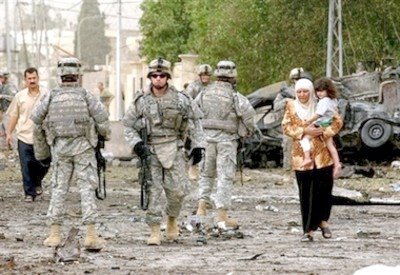Analysis: Training lower ranks in counter-insurgency techniques difficult

Soldiers inspect site of car bombing in Kirkuk today
WASHINGTON — Three years after insurgents appeared as a potent force in Iraq, the U.S. military has begun to expand its counterinsurgency training by focusing more closely on younger service members and junior officers.
The new emphasis on training the lower ranks reflects the growing view among top commanders that the war cannot be won by military might alone and that U.S. troops at all levels must be taught how to win the allegiance of the local population.
After the armed resistance started in earnest, commanders and senior officers began receiving specialized instruction in defusing insurgencies. But the principles have not always trickled down to the sergeants, corporals and privates who become the face of the American military to many Iraqis.
"Officer training is not enough," said David J. Kilcullen, an Australian army counterinsurgency expert working as a chief strategist at the State Department. "Anything you do as an individual, private soldier can have a big impact on the war."
A new Marine Corps manual designed for enlistees and junior officers is being distributed within the Army and Corps to fill the critical gap in military education. The focus on the younger personnel comes alongside development of a new counterinsurgency field manual for more senior officers that is due out next month.
To some critics, the belated response explains in part why America has stumbled in Iraq and highlights the continuing fallout from the Vietnam War aftermath, when the Pentagon decided the military's job was to win battles, not hearts and minds.
"The Army is trying very hard institutionally to catch up, but the problem is after Vietnam it got out of the counterinsurgency business," said Andrew Krepinevich, a former Army officer who has written extensively about how to defeat the insurgency in Iraq.
The new efforts have wide support but face challenges. Commanders are debating how to find time to train enlisted personnel who already are squeezed between multiple deployments abroad and shortened stays at home. Counterinsurgency experts do not always agree on who should be trusted with sensitive decisions, such as how much force to use against local populations. And counterinsurgency principles sometimes seem in conflict with the "warrior values" taught in boot camp.
Read the rest at the LA Times

<< Home